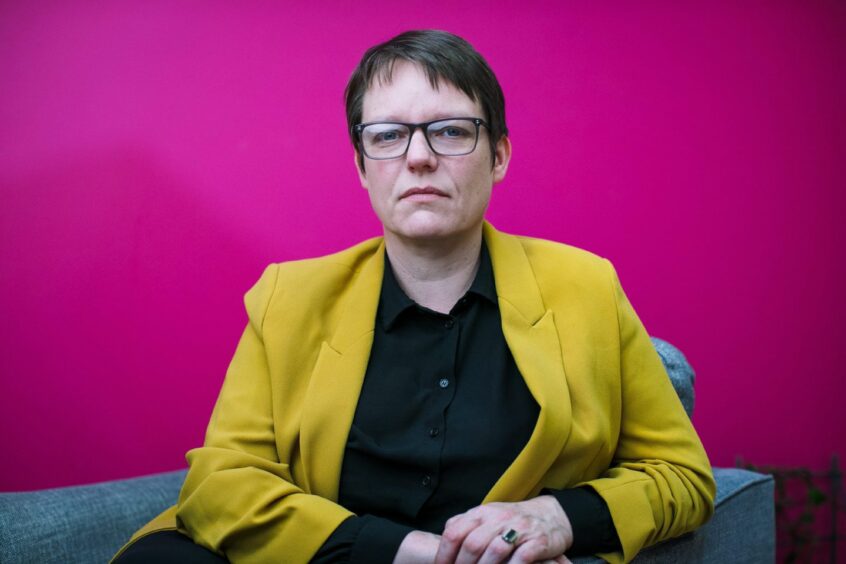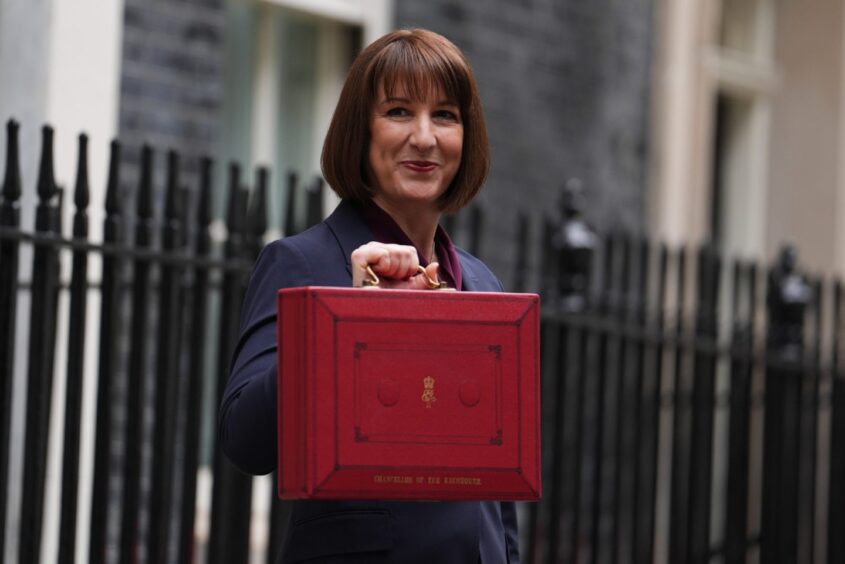
Scottish charity leaders have warned the sector is on its knees following the triple whammy of Covid, the cost-of-living crisis and the rise in employers National Insurance contributions.
They called employers’ NI increase “catastrophic” after Chancellor Rachel Reeves announced it in the autumn Budget.
The sector has already seen closures, funding difficulties and staff shortages in recent years – and there are now fears the situation will get worse.
Reeves revealed the move to hike employer NI contributions from 13.8% to 15% would come into force from April 2025 but the allowance – which enables employers to reduce their liability – would more than double to £10,500 to shield the smallest organisations from the tax.
The chief executive of Children in Scotland, Dr Judith Turbyne, has been in her role for three years and said it had been crisis after crisis in the charity sector.
She said: “There was Covid, there was the cost of living, and over that time what you’ve been seeing is, bit by bit by bit, a lot of charities getting stretched.
“Charities, traditionally since Victorian times, have played that key role in delivering services, in partnership with the statute services.
“I think one of the real things is, over these last three years, what you’re finding is that organisations offering services are getting increasingly stretched, and there’s a lot of different impacts about that.
“As for National Insurance – it’s lovely that there’s a proposal for bringing more money into public services.
“But, for charities, what that means – because we are not exempt, because we pay this money – it’s a real significant impact, particularly for middle-sized and big-size charities.
“So the tiny ones, if you’ve only got a few members of staff, they won’t be impacted, right? So that’s great. So you’ve got a few organisations out there who will be fine, but anybody who’s got about eight, it’s quite a few members of staff.
“For us – not a huge nor tiny organisation – it’s going to be about a £25,000 impact, which is a lot when everything else is stretched.
“What is it for other, bigger organisations that are offering multiple services? There are quite a few of them. You’ve got to budget for next year now, and that’s got to come out of something.
“And so, generally, what that means is it, bit by bit, you’ve got to make the difficult decisions.”
The National Council For Voluntary Organisations (NVCO) previously sent a letter signed by 7,300 charities and volunteer organisations to the Chancellor asking for them to be exempt from the hike, without success.
Rachel Cackett, CEO of the Coalition of Care & Support Providers In Scotland (CCPS), described Reeves’ response as an “absolutely crushing blow”.
The CCPS has now sent a letter signed by more than 80 not-for-profit social care organisations urging the Chancellor to provide relief on increased Employers’ National Insurance bills for them as providers of crucial public services.
The organisation represents nearly 90 providers of social care across Scotland estimated to have a bill of around £30 million next year with no way to pay it.
She said: “We can’t put prices up because we’re offering social care to people.
“Most of our providers, provide public services through contracts, and those contracts are already facing enormous pressure because the public sector doesn’t have enough money to do what it’s meant to do.
“So we hope that they’ll pay for it, but they may not, and the impact of that is going to be pretty catastrophic.”
“I think the letter from the Chancellor completely misunderstands how public services in a contemporary world are delivered because she’s giving relief to the public sector, but the public sector contracts us to deliver services on their behalf, and she’s not exempting us.
“So it’s a fundamental misunderstanding of the sector and the consequences of the decision and it not being thought through.
“And we will challenge the response, and we will do that thoroughly.
“But, in the end, if Westminster refuses to deal with the fact they’ve made a UK policy that will destabilise the UK social care market and NHS, essentially, then we will have to go to the Scottish Government to say you’re going to have to fund this, or you’re going to see a massive loss of service.”
The Treasury claimed the new measures included protections for small charities and businesses.
It said: “Our tax regime for charities, including exemption from paying business rates, is among the most generous of anywhere in the world, with tax reliefs for charities and their donors worth just over £6 billion for the tax year to April 2024.
“We have protected small charities and businesses by more than doubling the Employment Allowance to £10,500, meaning more than half of them with NICs liabilities either gain or see no change next year.
“Charities will still be able to claim employer NICs reliefs where eligible and are still exempt from business rates.”
NI rise, cost of living and Covid fallout hits groups that need help the most
Breast Cancer Now
“With more than 55,000 women diagnosed with breast cancer in the UK each year and prevalence rising, it’s more vital now than ever that we’re here for anyone affected by this devastating disease.
“The Covid-19 pandemic, ongoing cost-of-living crisis and recent rise in National Insurance costs to businesses have presented significant financial challenges to the charity sector, at a time when they are needed most by their beneficiaries.
“I’m extremely proud of how, at Breast Cancer Now, we’ve rapidly pivoted and adapted to ensure we continue to be there for those who’ve needed our support even more in these challenging times and, thanks to our incredible supporters, we’ve been able to minimise the financial impact of the triple-threat posed by these challenges on our charity.
“That said, navigating these challenges at a time when breast cancer diagnoses are rising, our need for people to donate to and support our work is greater than ever so that we can continue to meet the needs of anyone affected by breast cancer. We have bold ambitions and a vision that by 2050, everyone diagnosed with breast cancer will live and live well, but we cannot achieve this alone.”
Mind
“Charities provide vital services and support within communities, many of these are funded through statutory commissioning. We all know that over the last decade especially these contracts have become harder to deliver, the driving down of price also driving down choice and quality. The greatest burden of this is sadly carried by the people who need us most.
“Across the Mind federation, the implications of the NIC rise is eye-watering, at a time when we are trying to direct every penny towards delivering the best support. As not-for-profit organisations, we are asking for the government to reconsider the implications for us, and ultimately our ability to support our populations mental health.
“We want to do our bit to create a mentally healthy society, that includes ploughing everything we have into it, but we need the government to recognise this huge investment and not destabilise further by mounting costs we simply cannot continue to subsidise. We need a fair funding settlement, not another hefty bill.”
Marie Curie
“It is a real challenge in Scotland that in some places, all palliative care is fully funded as part of the NHS – in other areas only around 40% is funded, so the public are having to make up the difference. Care at the end of life should be as equally available as care at the start of life – but it is not.
“Funding of our services is not increasing at the same rate as our costs to deliver high-quality end-of-life care. This means we are constantly juggling how we can afford to deliver the services we know are needed and in some places, through no fault of our own, we have had to reduce the care we can give.
“There is not a level playing field for the people of Scotland – some health and social care partnerships will offer us a small uplift, others have not, but none are keeping up with increasing costs, particularly staff costs, and we now have to factor in an increase National Insurance contributions which will cost Marie Curie across the UK £2.9m.
“Every year, Marie Curie cares for over 8,000 people at home, and in our two Scottish hospices, but with 95% of people in Scotland predicted to need palliative care come 2040, if the system is already underfunded, and dying people are not getting the care and support they need now, it’s a devastating blow.”
Stroke Association
“The past four years have been a series of blows that have meant – and continue to mean – we’re not able to support as many stroke survivors as we want to.
“Covid saw us struggling to keep pace with demand for help, as we all grappled with social distancing and remote working, whilst rising inflation has meant we’ve increased salary spend to ensure our staff can afford the essentials.
“The National Insurance increase will affect staff costs moving forward to the tune of £700,000 annually. We’ve been working hard to raise funds to achieve our ambition of reaching every newly diagnosed stroke survivor with vital support. But we now need to work twice as hard to maintain our income and reach at the exact time when demand for our help is increasing.”

Enjoy the convenience of having The Sunday Post delivered as a digital ePaper straight to your smartphone, tablet or computer.
Subscribe for only £5.49 a month and enjoy all the benefits of the printed paper as a digital replica.
Subscribe © Andrew Cawley
© Andrew Cawley © Jordan Pettitt/PA Wire
© Jordan Pettitt/PA Wire